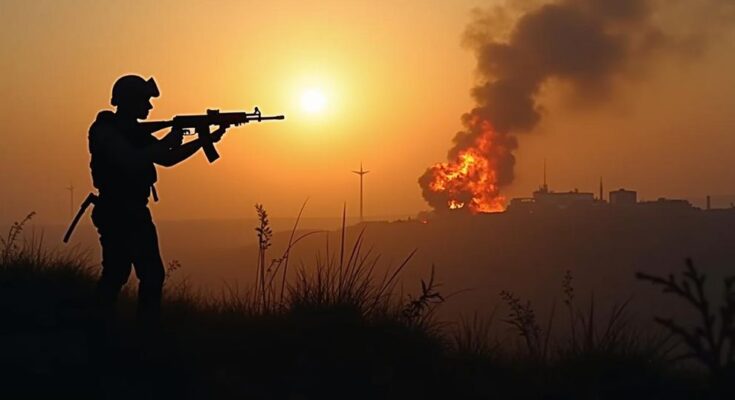The Israeli military has launched airstrikes against Hezbollah in Lebanon following the confirmed killing of leader Hassan Nasrallah, who was said to have been targeted in a strike in Beirut. Iran has vowed retaliation, declaring public mourning for five days. U.S. President Biden described the killing as just, while calling for a ceasefire amidst escalating violence.
The Israeli military conducted a series of airstrikes against Hezbollah targets in Lebanon early on Sunday, targeting launchers aimed at Israel following the announcement of the death of Hezbollah’s long-standing leader, Hassan Nasrallah. This escalation comes as Iran has vowed to retaliate for Nasrallah’s killing, which they regard as an unjust act. Iran’s supreme leader, Ayatollah Ali Khamenei, stated that his death “will not go unavenged” and invoked five days of public mourning. Meanwhile, U.S. President Joe Biden described the killing as a “measure of justice” for the alleged victims of Nasrallah’s actions over a decades-long tenure. Despite the violence, President Biden reiterated his call for a ceasefire between Israel and Hezbollah. The Israeli military reported that they had “eliminated” Nasrallah in a targeted airstrike in Beirut on Friday. Following this announcement, Hezbollah confirmed Nasrallah’s death and reiterated their commitment to continue fighting against Israel. Israeli Prime Minister Binyamin Netanyahu commented that this event would shift the “balance of power in the region for years to come.” The recent conflict has led to significant casualties, with Lebanon’s health ministry reporting at least 33 fatalities and nearly 200 injuries during the ongoing strikes.
The recent increase in hostilities between Israel and Hezbollah follows a notable event, the killing of Hassan Nasrallah, which has both heightened tensions and drawn international responses. The conflict between Israel and Hezbollah, a Lebanese militant group backed by Iran, has been longstanding and characterized by periodic escalations. The death of a high-profile leader like Nasrallah is seen as a significant development that could influence the dynamics of power and alliances in the region. Iran’s vow to avenge his death reflects a commitment to support Hezbollah amidst regional tensions, while calls for ceasefire from international leaders highlight the urgent need to restore peace.
In summary, the situation in the Middle East has become increasingly volatile following the death of Hassan Nasrallah, with Israel engaging in extensive military action against Hezbollah targets in Lebanon. Iran’s promise of retaliation signifies a potential for further escalation in the conflict. Both domestic and international leaders have reacted, with statements highlighting the multifaceted implications of this event on regional stability. As the situation unfolds, ongoing monitoring will be essential to understand its impact on broader geopolitical dynamics.
Original Source: www.france24.com




